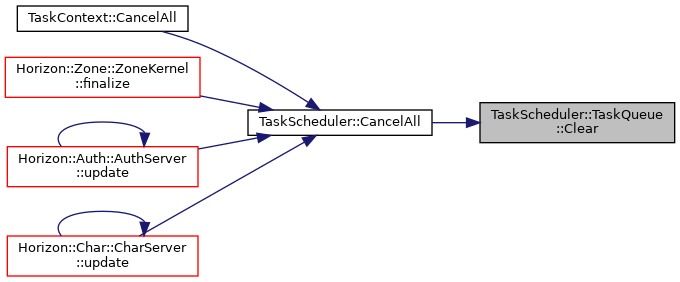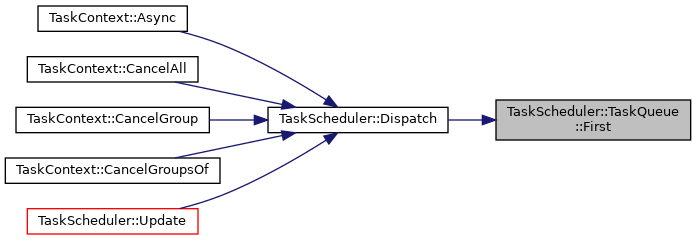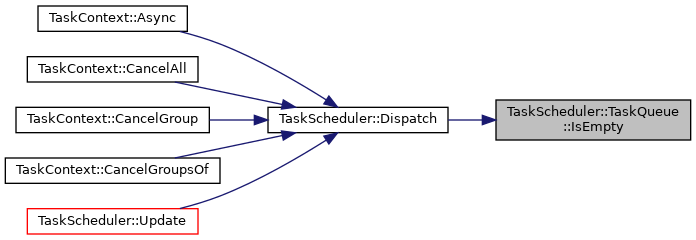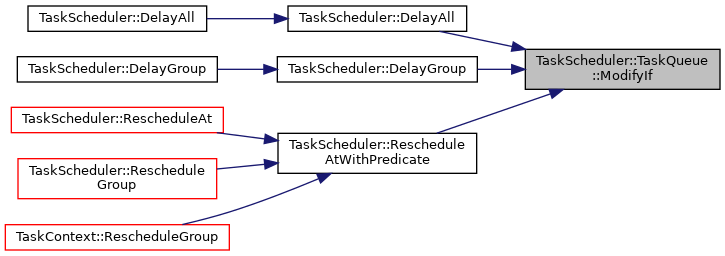TaskScheduler::TaskQueue Class Reference
Public Member Functions | |
| void | Push (TaskContainer &&task) |
| TaskContainer | Pop () |
| Pops the task out of the container. More... | |
| TaskContainer const & | First () const |
| void | Clear () |
| void | RemoveIf (std::function< bool(TaskContainer const &)> const &filter) |
| void | ModifyIf (std::function< bool(TaskContainer const &)> const &filter) |
| std::size_t | Count (group_t const &group) |
| bool | IsEmpty () const |
Private Attributes | |
| std::multiset< TaskContainer, Compare > | container |
Member Function Documentation
◆ Clear()
| void TaskScheduler::TaskQueue::Clear | ( | ) |
136{
137 container.clear();
138}
std::multiset< TaskContainer, Compare > container
Definition: TaskScheduler.hpp:178
Referenced by TaskScheduler::CancelAll().
 Here is the caller graph for this function:
Here is the caller graph for this function:◆ Count()
| std::size_t TaskScheduler::TaskQueue::Count | ( | group_t const & | group | ) |
141{
142 std::size_t count = 0;
143
145 it != container.end(); it++) {
146 if ((*it)->IsInGroup(group))
147 count++;
148 }
149
151}
size_t count(GridTypeListContainer< SPECIFIC_TYPE > const &elements, SPECIFIC_TYPE *)
Definition: GridReferenceContainer.hpp:100
References GridTypeListIterator::count().
Referenced by TaskScheduler::Count().
 Here is the call graph for this function:
Here is the call graph for this function: Here is the caller graph for this function:
Here is the caller graph for this function:◆ First()
| auto TaskScheduler::TaskQueue::First | ( | ) | const |
◆ IsEmpty()
| bool TaskScheduler::TaskQueue::IsEmpty | ( | ) | const |
◆ ModifyIf()
| void TaskScheduler::TaskQueue::ModifyIf | ( | std::function< bool(TaskContainer const &)> const & | filter | ) |
163{
164 std::vector<TaskContainer> cache;
166 if (filter(*itr))
167 {
168 cache.push_back(*itr);
169 itr = container.erase(itr);
170 }
171 else
172 ++itr;
173
174 container.insert(cache.begin(), cache.end());
175}
Referenced by TaskScheduler::DelayAll(), TaskScheduler::DelayGroup(), and TaskScheduler::RescheduleAtWithPredicate().
 Here is the caller graph for this function:
Here is the caller graph for this function:◆ Pop()
| auto TaskScheduler::TaskQueue::Pop | ( | ) |
Pops the task out of the container.
123{
126 return result;
127}
Referenced by TaskScheduler::Dispatch().
 Here is the caller graph for this function:
Here is the caller graph for this function:◆ Push()
| void TaskScheduler::TaskQueue::Push | ( | TaskContainer && | task | ) |
References container.
Referenced by TaskScheduler::InsertTask().
 Here is the caller graph for this function:
Here is the caller graph for this function:◆ RemoveIf()
| void TaskScheduler::TaskQueue::RemoveIf | ( | std::function< bool(TaskContainer const &)> const & | filter | ) |
Referenced by TaskScheduler::CancelGroup().
 Here is the caller graph for this function:
Here is the caller graph for this function:Member Data Documentation
◆ container
|
private |
Referenced by Push().
The documentation for this class was generated from the following files:
- src/Utility/TaskScheduler.hpp
- src/Utility/TaskScheduler.cpp








